Finding a Career Calling in the Health Sciences Sensor Lab
A varied career path led Dr. Gustavo de Oliveira Almeida to his ideal job of helping investigators advance research through sensor technology.
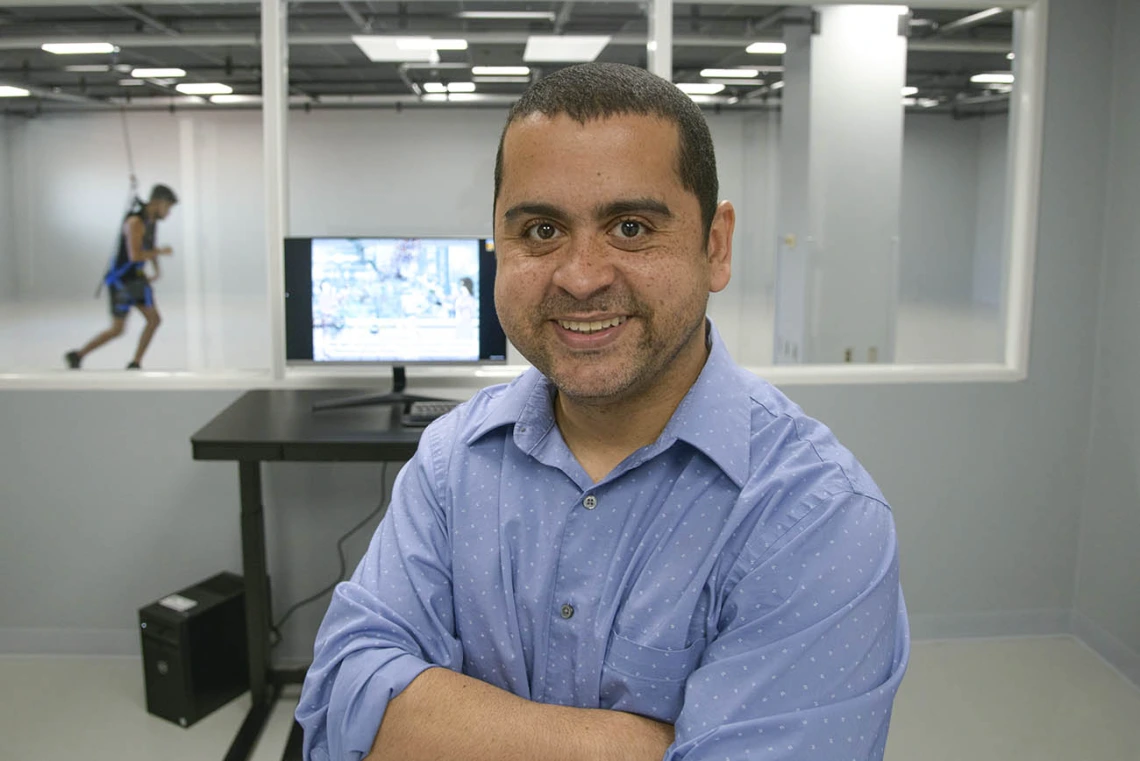
Dr. Gustavo De Oliveira Almeida’s fascination with applying data science to real life led him to his dream job as coordinator of the University of Arizona Health Sciences Sensor Lab.
As a child growing up in Rio de Janeiro, Gustavo de Oliveira Almeida, PhD, never had a dream job. A curious problem-solver with a knack for acquiring new technical skills, he went on to work as a logistics technician for a steel company, a research assistant for a multilateral international development bank and a government consultant. His business and academic pursuits took him around the world to places like Cape Verde, Colombia, Washington, D.C., and New York City.
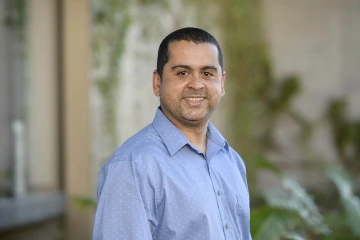
Gustavo De Oliveira Almeida, PhD, had already earned one doctorate in Brazil when he moved to the United States to pursue additional education in data science.
“It’s been kind of random. For me, the journey has been to try new things and find new knowledge. Now, I feel like I get to do that almost every day,” said Dr. Almeida, coordinator for the University of Arizona Health Sciences Sensor Lab.
The Sensor Lab, which celebrated its grand opening in March, is part of a UArizona Health Sciences strategic initiative to open new frontiers for better health. It offers state-of-the-art sensor systems, development platforms and reconfigurable testing spaces, as well as expertise in data collection and analysis, to researchers and students across the university.
New path, new mentor
Dr. Almeida’s trek to UArizona Health Sciences began in Brazil, where he received a doctorate in administration from the Getulio Vargas Foundation in 2013 and secured a professorship at the Federal Fluminense University.
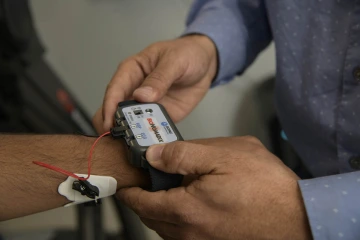
Dr. Almeida is able to offer expert advice on a wide range of technology, from flexible wearable sensors, such as the one pictured, to environmental monitoring, 360 video and audio recording, and virtual and extended reality equipment.
“I liked it so much that I wanted to get a PhD in informatics,” Dr. Almeida said of his 2018 decision to return to school.
His new academic interest took Dr. Almeida to the New York University (NYU) Rory Meyers School of Nursing, where he was a visiting scholar assigned to the NYU-X Lab and National Science Foundation (NSF) Holodeck. There, Dr. Almeida began working with Winslow Burleson, PhD, who would become one of his most influential mentors.
Dr. Burleson, now the director of research at the School of Information in the UArizona College of Social and Behavioral Sciences, a founding faculty member in Health Sciences Design and a BIO5 Institute member, is the principal investigator for the NSF Holodeck. Funded by an NSF grant, the Holodeck seamlessly integrates the physical with the virtual to create a unique research environment with unparalleled tools for intellectual and creative output.
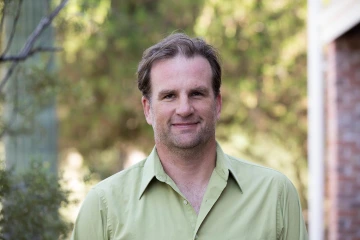
Win Burleson, PhD, director of the Holodeck, mentored Dr. Almeida at New York University. When Dr. Burleson moved to UArizona, Dr. Almeida followed, calling Dr. Burleson’s mentorship pivotal in his decision to pursue data science as a career.
“A key moment for me was working for Win, because it was more than data,” Dr. Almeida recalled. “It was applying it to real life.”
Dr. Almeida was fascinated by the Holodeck and other medical simulation training tools that allowed him to apply his technical expertise to supporting health care.
“When we started the Holodeck, we settled on simulation, teamwork and physiological sensors as areas Gustavo could help right away,” Dr. Burleson said. “That is where he started to put together some of the core projects that he has worked on even to this day.”
Another stepping stone
In August 2019, Dr. Burleson transitioned to UArizona, aligning the Holodeck with the School of Information and the UArizona Health Sciences Design program, another strategic initiative. Dr. Almeida soon followed.
Once in Tucson, Dr. Almeida quickly took advantage of another opportunity: the Data Science Fellows program. The year-long program provides training and mentorship to UArizona postdoctoral scientists and doctoral candidates in the area of data science.
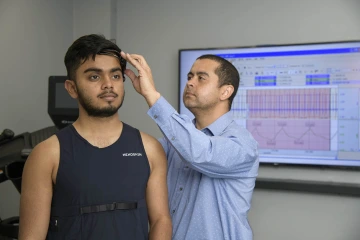
Dr. Almeida attaches sensors to a research study participant. The sensors will give researchers real-time physiological data as the participant exercises on a treadmill.
“The challenge is collecting as many data streams as possible in real time,” Dr. Almeida explained. “We no longer use only one information stream. We want to be able to use multiple sensors that are collecting high-quality data in real time, and then have the capability in real-time to build an action off of that data.”
Dr. Almeida credited the Data Science Fellows program for broadening his vision of data science. In addition to technical data analysis training, Dr. Almeida and his peers learned best practices for project management and consulting, and leadership strategies for working in teams. In addition to research applications, they gained business perspective on how data scientists can help solve real-world problems.
“I feel like I am in a place where I get to do what I enjoy doing. I can help others accomplish their goals.”
Gustavo de Oliveira Almeida, PhD
“Gustavo has superb technical skills, but he is one of those rare individuals who can also collaborate and work in a team very well,” Dr. Burleson said. “He has the interpersonal soft skills that are critical to advancing a vision.”
The combination of skills impressed Dr. Burleson and Jennifer Barton, PhD, director of both the Sensor Lab and the BIO5 Institute. After interviewing several candidates for the coordinator position, they knew Dr. Alemida was perfect for the job.
“He had everything we wanted in a coordinator, and he also had the relationships and institutional knowledge already in place,” Dr. Burleson said. “That is one of the benefits of programs like the Data Science Fellows Program, where we can develop our own pipeline of talented people.”
Providing expertise to the experts
Researchers often know the data they need to collect, but they may not know the most efficient or cost-effective way to collect and analyze their data. That is where Dr. Almeida comes in.
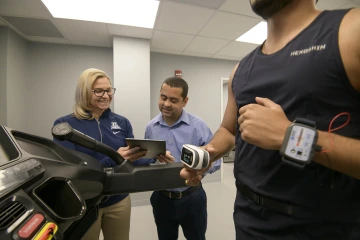
From left: Jennifer Barton, PhD, and Dr. Almeida check the data being collected from a study participant as he runs on a treadmill in the Sensor Lab.
“The principal investigators are the experts in their subject matter,” said Dr. Almeida, who earned his second doctorate, this time in informatics, in May 2022. “They know a lot more than I do about what they are studying. What I can do is help them implement the right technology for their project and ensure they have what they need to analyze the data they collect.”
Sensor technologies produce a wealth of high-quality data that can be used to analyze the general health, social, emotional and mental well-being of study participants. Dr. Almeida collaborates with researchers to introduce these technologies into original research projects.
“I think the Sensor Lab can become one of the crown jewels of the university,” Dr. Burleson said. “With someone like Gustavo in place, we have a cohesive capacity to do projects that we otherwise wouldn’t be able to do.”
“I feel like I am in a place where I get to do what I enjoy doing,” Dr. Almeida added. “I can help others accomplish their goals.”

